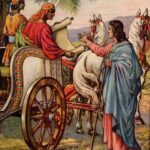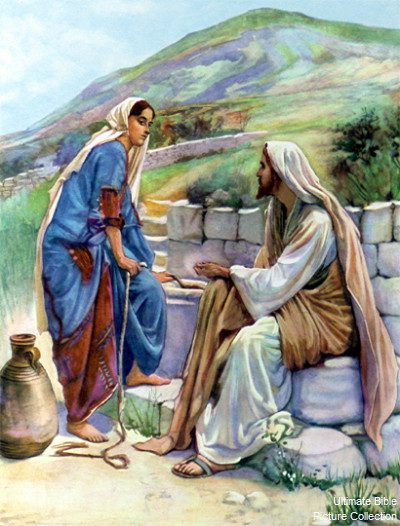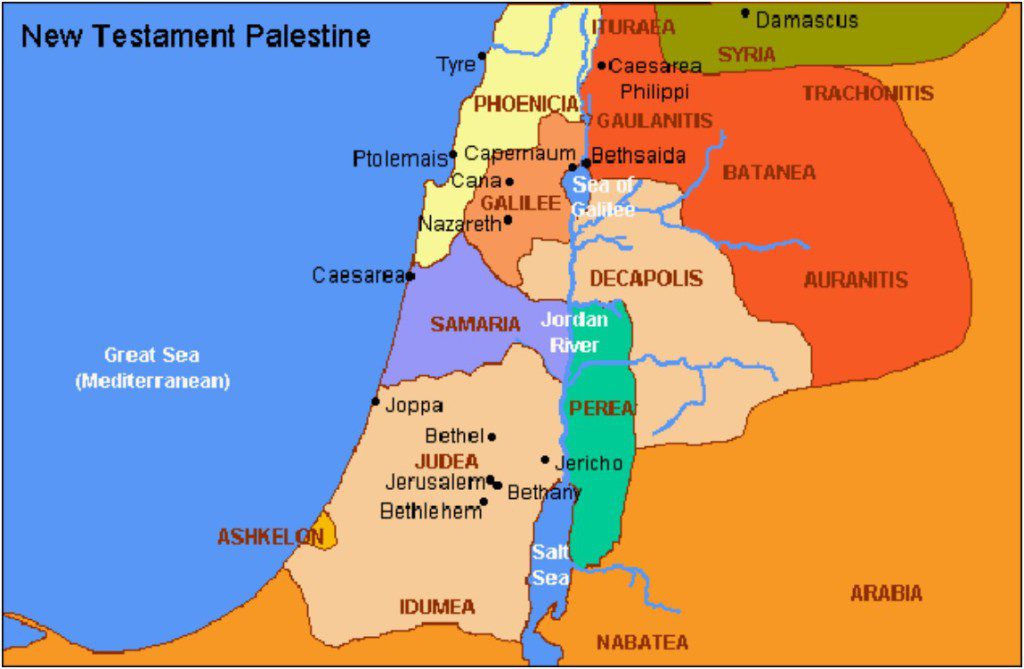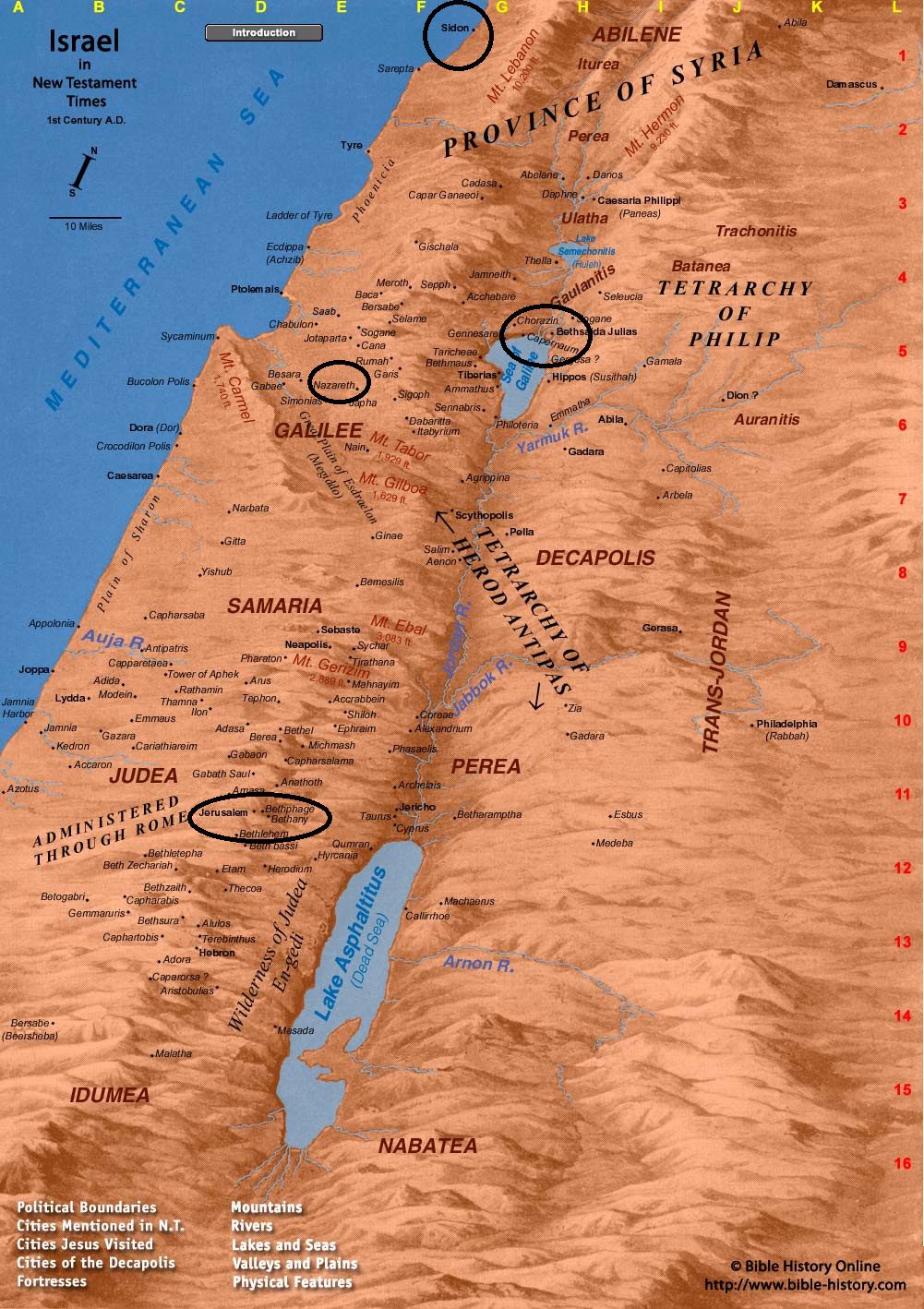ACTS of Philip the Evangelist
Φίλιππος Philip who?
Luke 3:1 Now in the fifteenth year of the reign of Tiberius Caesar, when Pontius Pilate was governor of Judea, and Herod [Antipas] was tetrarch of Galilee and his brother Philip was tetrarch of the region of Ituraea and Trachonitis ..
- (No, not that Philip, whose wife Herodias his brother Herod Antipas took as his own wife.)
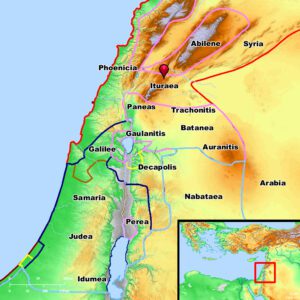
Jesus chose Twelve Apostles at the beginning His ministry in Galilee. The Apostle Philip was one of the Twelve.
Philip has been an Apostle for about five years now. The year c. A.D. 32 or 33.
- (But it’s not that Philip, either. Don’t get confused like I did.)
When Simon Peter healed a lame man and spoke at Solomon’s Portico just two years ago, Philip would have observed the entire miracle. (Actually, two men named Philip may have been present.)
Our other brother Philip 🙂
As we learned in An Apostolic Model: Administration of a Growing Church from Acts 6:
As the church grew rapidly, the twelve summoned the multitude of the disciples, asking them to choose seven men of good reputation, full of the Holy Spirit and wisdom to lead in ministering to the Church: Steven, Philip and five others.
- (Yes, this other brother Philip, a leading deacon of the Church, second in the list of seven, is known as Philip the Evangelist.)
So now after Stephen’s trial, the Church in Jerusalem faces imminent persecution.
Philip heads back north through the mountains of Judea, traveling one of their usual routes to Galilee through Samaria.
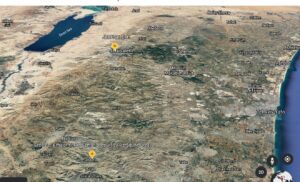
Acts 8:
We will return to Luke's chronology shortly, but lets begin with a parallel timeline from his account of events in *Sebastia from the perspective of its people.
The ‘not so good’ *Samaritan
..there was a certain man called Simon, who previously practiced sorcery [μαγεύω] in the city and astonished the people of *Samaria, claiming that he was someone great, to whom they all gave heed, from the least to the greatest, saying, “This man is the great power of God.”
μάγος – magus
- the name given by the Babylonians (Chaldeans), Medes, Persians, and others, to the wise men, teachers, priests, physicians, astrologers, seers, interpreters of dreams, augers, soothsayers, sorcerers etc.
- the oriental wise men (astrologers) who, having discovered by the rising of a remarkable star that the Messiah had just been born, came to Jerusalem to worship him
- a false prophet and sorcerer
Luke had begun his account with Philip's departure from Jerusalem following the execution of Stephen.
Philip went down to the city of Samaria
ACTS of the Apostles 8:5 NASB20
and began proclaiming the [Messiah] Christ to them.
Philip leaves for *Samaria fully aware its reputation. He's been there before and passed through the town many times. And Jesus had illustrated general Jewish thought about this city and these northern tribes in the Parable of the Good Samaritan.
Miracles and Signs by Philip
6 And the multitudes with one accord heeded the things spoken by Philip, hearing and seeing the miracles which he did. For unclean spirits, crying with a loud voice, came out of many who were possessed;
Philip, along with the Apostles and many other disciples following the Lord had witnessed Jesus’ power to command evil spirits. Peter healed a lame man in Jerusalem, just one of several Apostolic signs of power. Now we learn of Philip’s miracles by the power of the Holy Spirit.
and many who were paralyzed and lame were healed.
ACTS (of the Apostle philip) 8:7b – NKJV
GOOD vs. EVIL!
Scripture records several contests similar to Philip’s opposition. Some of these contests between God (good) and evil have taken place on this very mountain where Philip encounters Simon Magus.
False prophets and idolaters deceive others by spirits (i.e. demons, devils, angels) from all that is evil.
Our 21st century Christian minds easily dismiss powers we cannot explain.
- Do you really believe in such powers of the spiritual realms?
Acts reveals the Power of the Holy Spirit [πνεῦμα].
- “You men who are stiff-necked and uncircumcised in heart and ears are always resisting the Holy Spirit G4151; you are doing just as your fathers did. – Acts 7:51
- But he, being full of the Holy Spirit G4151, looked intently into heaven and saw the glory of God, and Jesus standing at the right hand of God – Acts 7:55
- They went on stoning Stephen as he called on the Lord and said, “Lord Jesus, receive my spirit G4151!” – Acts 7:59
The HOLY SPIRIT of the ONE GOD, WHO IS One with God the Father and the One begotten Son Christ Jesus, works for good in the hearts and lives of sinful men and women like us once we turn to Jesus as our Lord and Savior.
- Acts of the Apostles is a first century account of a continuing battle between Good and Evil.
- The Good News (Gospel) of the Lord’s death and resurrection is that JESUS will win this war.
Simon Covets Philip’s Power
Of course this power is not from Philip, but from the Holy Spirit.
11 They [the Samaritans] were attentive to him {Simon] because he had amazed them with his sorceries for a long time. But when they believed Philip, as he proclaimed the good news about the kingdom of God and the name of Jesus Christ, both men and women were baptized.
13 Even Simon himself believed. And after he was baptized, he followed Philip everywhere and was amazed as he observed the signs and great miracles that were being performed.
- Philip’s signs are more powerful than the power of Simon Magus, who the Samaritans called, ‘the great power of God!’
- Was Simon’s baptism a complete turning from evil and a permanent cleansing?
- Did Simon receive the Holy Spirit
- (even as Ananias and Saphira had claimed, yet sought to deceive the Holy Spirit and other believers)?
- Luke tell us: 16 ‘They had only been baptized in the name of the Lord Jesus.
- Baptism alone does not make you any more faithful to Jesus than Ananias and Saphira OR Judas.
Philip continues teaching of new believers in Samaria with great success.
Meanwhile, back in Jerusalem..
14 When the apostles who were at Jerusalem heard that Samaria had received the word of God, they sent Peter and John to them.
Why Peter and John?
About eight days after these sayings, He took along Peter, John, and James, and went up on the mountain to pray.
Luke 9:28 NASB20
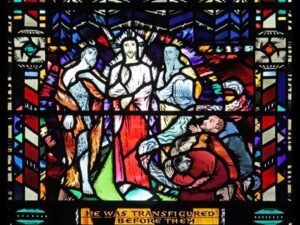
Peter, James and John know the Person of Jesus more intimately than the other nine Apostles.
- These three comprised an inner-circle of leadership for the Lord Jesus.
- The Twelve in turn lead other disciples (hundreds of them at times), so that now these Apostles lead a growing Church.
The Lord Jesus Christ ascended into heaven! (At the conclusion of Luke’s Gospel and opening of ACTS of the Apostles, leadership passes to them.)
Simon Peter leads this inner circle of the Apostles, all of the Twelve (including Mathias), Jerusalem’s seven deacons (including Stephen and Philip); and NOW [c. A.D. 33] many disciples of Jesus beyond Jerusalem as they, ‘Go into all the world and proclaim the Gospel.’
Peter and John join Philip in Samaria
ACTS 8:15 After they went down there, they prayed for them so that the Samaritans might receive the Holy Spirit because he had not yet come down on any of them..
Then Peter and John laid their hands on them, and they received the Holy Spirit.
- Apparently Simon is not of one accord with these new believers in Samaria. So the magician has missed out on the blessings of the Holy Spirit;
- But the powerful always covet more power.
18 And when Simon saw that through the laying on of the apostles’ hands the Holy Spirit was given, he offered them money, saying,
“Give me this power also, that anyone on whom I lay hands may receive the Holy Spirit.”
If Simon’s story had ended here
- Would you recognize this false prophet, a teacher with power?
- Do you realize that such a man must bow down to the LORD God or face judgment with eternal consequence?
- Does Scripture not warn us how to handle such sheep in the designer clothing of wolves?
ACTS of the First Century Church
Stephen had just called out such false leaders in Jerusalem! For two years now the Apostles have demonstrated signs from God to Jerusalem’s leaders. Revenge and persecution fill its political streets.
These leaders of the Great City of religion misused Scripture. AND false accusation meant to silence opposition to the Truth of the Gospel, resulted in their false leadership condemning Stephen to death!
The Lord Jesus Christ had warned of others to come. Simon Magnus could have been one of the first.
“And many false prophets will rise up and mislead many people.

Peter’s Reaction to Simon
YOU want such power, right? To make a lame man stand? Heal someone’s cancer? Help someone paralyzed with pain to get up and walk once more? Even to save a young man or woman from death? (Stephen was just thirty years old)
So did Simon, who like so many just offered to pay Peter for such POWER.
“Give me also this ability so that everyone on whom I lay my hands may receive the Holy Spirit.”
ACTS 8:19 NIV – Simon’s request to Peter
PETER would have none of it.
20 But Peter replied,
“May your money be destroyed with you for thinking God’s gift can be bought! You can have no part in this, for your heart is not right with God.
Acts of the Apostles 8:20-21 NLT
Is YOUR heart right with God?
8:21 οὐκ ἔστιν σοι μερὶς οὐδὲ κλῆρος ἐν τῷ λόγῳ τούτῳ ἡ γὰρ καρδία σου οὐκ ἔστιν εὐθεῖα ἔναντι τοῦ θεοῦ
21 وَلَيْسَ لَكَ حِصَّةٌ أوْ نَصِيبٌ فِي هَذَا الأمْرِ، لِأنَّ قَلْبَكَ لَيْسَ سَلِيمًا أمَامَ اللهِ. 22 فَتُبْ عَنْ شَرِّكَ هَذَا وَصَلِّ إلَى الرَّبِّ، لَعَلَّهُ يُسَامِحُكَ عَلَى الفِكرَةِ الآثِمَةِ الَّتِي فِي قَلْبِكَ. 23 فَأنَا أرَاكَ مُمتَلِئًا مَرَارَةً وَعَبدًا لِلخَطِيَّةِ.»
ACTS of Repentance
“Therefore, repent of this wickedness of yours,
Acts of the Apostles 8:22 NASB20 – Peter’s admonition to Simon Magnus
and pray to the Lord that, if possible, the intention of your heart will be forgiven you.
23 for I can see that you are full of bitter jealousy and are held captive by sin.”
24 “Pray to the Lord for me,” Simon exclaimed, “that these terrible things you’ve said won’t happen to me!”
Returning to the scene of the crimes against Christ and His Church:

25 After testifying and preaching the word of the Lord in Samaria, Peter and John returned to Jerusalem. And they stopped in many Samaritan villages along the way to preach the Good News.
ACTS of Philip (the Deacon Evangelist): TO BE CONTINUED...
